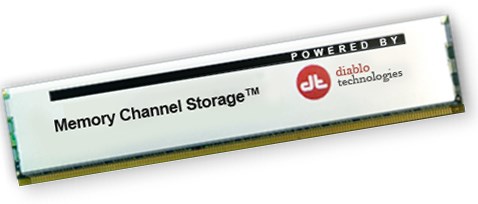
Posted on Thursday, August 01 2013 @ 14:08 CEST by Thomas De Maesschalck
A new company called Diablo Technologies introduces Memory Channel Storage (MCS), a new storage and system memory solution that basically lets you install a solid state disk in a DDR3 memory slot. The benefit of this is that you can achieve very low latencies and even higher performance than that offered by PCIe SSDs. It's unknown when the first products based on this technology may arrive, but it seems the company primarily targets the blade server market.
Diablo Technologies, a proven innovator in advanced memory system interface products, today introduced Memory Channel Storage (MCS), a transformational new storage and system memory solution, resetting the bar for latency and throughput for enterprise applications.
Diablo leveraged its extensive experience in advanced memory channel interfaces and protocols to deliver a superior system architecture that directly attaches persistent memory to the host processors of a server or storage array. This innovative approach utilizes the industry standard DIMM form factor and native CPU memory interface, allowing MCS to be a drop-in replacement for standard RDIMMs. The architecture delivers the highest, most economical scaling of any enterprise storage solution on the market today, with persistent latencies approaching that of DRAM and linear scaling of throughput with additional modules.
"Flash SSDs boost system performance, and flash over PCIe is even faster, but the best performance will come from flash on the memory channel," said Jim Handy, Director at Objective Analysis. "Diablo is on the right path by providing a way to plug flash right into the DDR memory buses on today's servers."
Configuring MCS as a traditional block storage device enables new performance levels for applications, all the while reducing latencies by more than 85% over PCI-Express based SSDs and 96% over SATA/SAS based SSDs. MCS latencies are not only significantly lower than any other flash based storage, but also provides deterministic latencies with minimal variability, allowing applications to commit data quickly and consistently.
In addition to block storage, Memory Channel Storage can also be configured to expand system memory from gigabytes to terabytes, dramatically improving the performance of large in-memory applications. This unparalleled capability provides a 100x increase in accessible memory and allows the entire application data set to reside in the CPU memory space. This disruptive capability makes MCS uniquely well suited for memcached, big data analytics, and other large in-memory applications.
"Performance in storage and density in DRAM have massively fallen behind the curve of CPU capability and growing data capacity needs, which ultimately reduces application performance and increases TCO for users. Flash is the key to a balanced compute architecture and massive application acceleration," said Riccardo Badalone, Chief Executive Officer at Diablo. "The arrival of MCS finally allows applications to leverage the benefits of flash memory connected directly to the processor's memory controllers, which will ultimately change the cost/density/performance rules forever."
Memory Channel Storage is ideally suited for applications critical to large enterprise customers where high performance at deterministic, ultra-low latency is required for ultimate efficiency, including:
Database / Cloud
Big Data Analytics
High Frequency Trading and other financial applications
Server and Storage Virtualization and Consolidation
Virtual Desktop Infrastructure
MCS is compatible with any industry-standard DDR3 memory slot, allowing deployment across the full spectrum of server and storage system designs, chassis' and form-factors. The MCS architecture is particularly attractive for blade servers, where PCIe slots are severely limited in availability and size, requiring costly and custom designs and reduced flash storage capacity.

